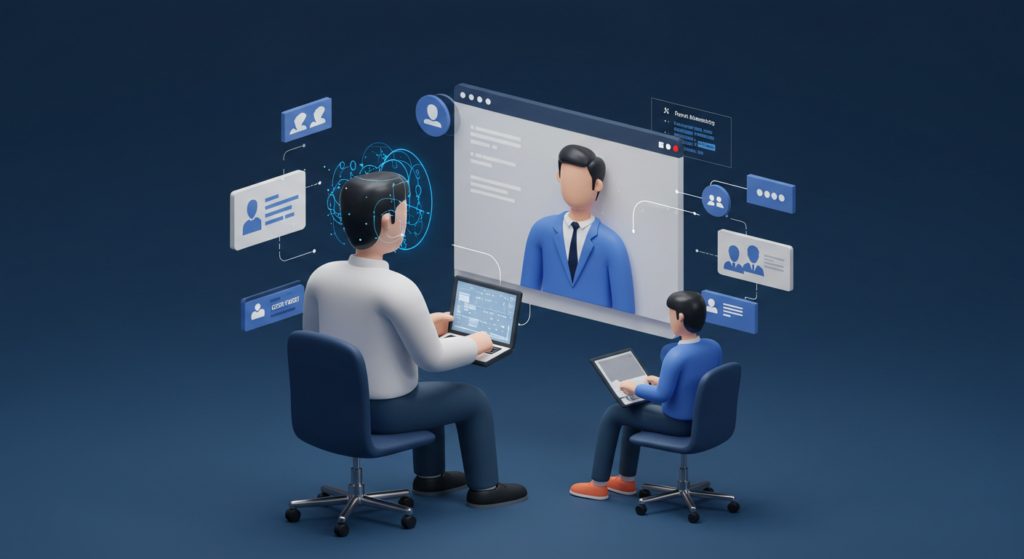The recruitment landscape has undergone a dramatic evolution in recent years, with voice AI emerging as a game-changing technology that’s reshaping how organizations identify, assess, and secure top talent. As we navigate through 2025, the integration of voice artificial intelligence in hiring processes has moved from experimental to essential, offering unprecedented efficiency and insights that traditional methods simply cannot match.
The Evolution of Recruitment Technology: From Resume Parsing to Voice Analysis
Recruitment technology has come a long way from the days of manual resume screening and in-person interviews. The journey began with basic applicant tracking systems, evolved to AI-powered resume parsing, and has now entered an era where voice artificial intelligence is revolutionizing every stage of the hiring process.
According to recent data from the Society for Human Resource Management, organizations using advanced AI recruitment tools report a 35% reduction in time-to-hire and a 42% improvement in quality-of-hire metrics. These impressive statistics highlight why voice AI adoption in recruitment has surged from just 12% of Fortune 500 companies in 2022 to over 67% in 2025.
But what exactly makes voice AI such a transformative force in recruitment? Let’s explore the key ways this technology is reshaping hiring processes in 2025.
7 Ways Voice AI is Revolutionizing the Recruitment Process in 2025
-
Automated Initial Candidate Screening at Scale
One of the most time-consuming aspects of recruitment has always been the initial screening process. Recruiters typically spend hours reviewing applications and conducting preliminary phone interviews to identify qualified candidates.
Voice AI has transformed this process by enabling:
- Automated screening interviews that can be conducted simultaneously with thousands of candidates
- Natural language processing that evaluates responses to standardized questions
- Sentiment analysis that gauges candidate enthusiasm and engagement
- 24/7 availability that accommodates candidates across different time zones
Sarah Johnson, Head of Talent Acquisition at TechForward, shares: “Our implementation of voice AI screening has allowed our recruiters to focus on high-value activities instead of preliminary screenings. We’ve increased our screening capacity by 400% while reducing our recruiters’ administrative workload by 65%.”
-
Reducing Unconscious Bias in the Hiring Process
Unconscious bias remains one of the most persistent challenges in recruitment. Traditional interviews are particularly susceptible to various forms of bias, including affinity bias, halo effect, and confirmation bias.
Voice AI recruitment tools are helping organizations address this challenge through:
- Standardized question delivery ensuring all candidates receive the same interview experience
- Bias-detection algorithms that flag potentially biased language or assessment patterns
- Focus on content rather than delivery by analyzing what candidates say rather than how they look
- Blind assessment options that evaluate responses without revealing identifying information
Research published in the Harvard Business Review found that companies implementing AI-driven blind assessment techniques saw a 31% increase in diversity among new hires in technical roles, demonstrating the tangible impact of these technologies on creating more equitable hiring processes.
-
Enhanced Candidate Experience Through Conversational AI
The candidate experience has become a critical differentiator for employers in the competitive talent market of 2025. Voice AI is playing a pivotal role in creating more engaging, responsive, and personalized experiences for job seekers.
Modern voice AI recruitment platforms offer:
- Conversational interfaces that feel natural and engaging
- Immediate feedback and guidance throughout the application process
- Personalized interactions based on candidate responses and preferences
- Multi-language support that accommodates global talent pools
Candidates consistently rate our voice AI interview process 4.8 out of 5 stars,” notes Miguel Sanchez, Recruitment Innovation Director at Global Talent Solutions. “They appreciate the flexibility to complete interviews on their own schedule and the immediate feedback they receive, which wasn’t possible with our previous processes.
-
Deep Linguistic Analysis for Better Candidate Matching
Beyond simply understanding what candidates say, advanced voice AI systems in 2025 can analyze *how* they say it, extracting valuable insights that help match candidates to the right roles and teams.
These sophisticated systems evaluate:
- Communication patterns that indicate problem-solving approaches
- Linguistic markers correlated with specific soft skills
- Speech characteristics that align with company culture and team dynamics
- Response structure that demonstrates critical thinking and organization
A landmark study by MIT’s Workforce Analytics Lab found that voice AI assessment can predict job performance with 23% greater accuracy than traditional interviews when properly calibrated to organization-specific success factors.
-
Real-time Feedback and Coaching for Interviewers
Voice AI isn’t just transforming the candidate side of recruitment—it’s also revolutionizing how interviewers conduct conversations and make decisions.
In 2025, recruitment teams are leveraging voice AI for:
- Real-time guidance during interviews to explore relevant topics
- Bias alerts when questioning patterns show potential favoritism
- Consistency tracking across different interviews and interviewers
- Suggestion prompts for follow-up questions based on candidate responses
“The voice AI coaching system has dramatically improved our interview quality,” explains Jordan Williams, VP of People Operations at Innovate Inc. “Our interviewers receive subtle guidance during conversations, helping them cover all critical areas while maintaining a natural flow. The post-interview analytics have become an invaluable training tool for our team.”
-
Predictive Analytics for Long-term Success
Perhaps the most powerful application of voice AI in recruitment is its ability to identify patterns that predict long-term success within specific organizations and roles.
Advanced voice AI recruitment systems now offer:
- Success pattern matching based on characteristics of top performers
- Team compatibility analysis to ensure cultural and working style fit
- Retention probability scoring to identify candidates likely to stay long-term
- Performance trajectory prediction based on communication patterns
Organizations implementing these predictive capabilities report a 27% reduction in early-stage turnover and a 19% improvement in first-year performance ratings among new hires, according to the International Association for Talent Development’s 2025 State of Recruitment Technology report.
-
Seamless Integration with Broader HR Technology Ecosystem
In 2025, voice AI recruitment tools don’t exist in isolation but function as part of an integrated talent management ecosystem.
Modern implementations feature:
- Bidirectional data flow with applicant tracking systems
- Candidate profile enrichment across the talent lifecycle
- Onboarding pathway customization based on interview insights
- Continuous learning algorithms that improve with each hiring cycle
This integration ensures that insights gathered during the recruitment process inform subsequent talent development activities, creating a seamless experience from candidate to employee.
Implementing Voice AI in Your Recruitment Strategy: Best Practices
For organizations looking to leverage voice AI in their recruitment processes, following these best practices can help ensure successful implementation:
-
Start with Clear Objectives
Define what you want to achieve with voice AI recruitment technology:
- Reducing time-to-hire
- Improving candidate quality
- Enhancing diversity and inclusion
- Scaling recruitment capabilities
-
Ensure Ethical Implementation
Develop clear guidelines for ethical AI use:
- Transparent communication with candidates about AI use
- Regular auditing for bias or adverse impact
- Human oversight of AI-driven decisions
- Compliance with relevant regulations like GDPR and EEOC guidelines
-
Combine AI with Human Expertise
Create a balanced approach that leverages both AI efficiency and human judgment:
- Use AI for initial screening and data gathering
- Have human recruiters conduct final interviews
- Implement collaborative decision-making processes
- Provide options for candidates to request human interaction
-
Continuously Train and Refine Your AI
Improve your voice AI system over time:
- Regularly update training data with new successful hires
- Incorporate feedback from recruiters and candidates
- Adjust algorithms based on performance outcomes
- Benchmark against industry standards and best practices
The Future of Voice AI in Recruitment: What’s Next?
As we look beyond 2025, several emerging trends are likely to shape the next evolution of voice AI in recruitment:
Emotion AI Integration
Advanced systems will better understand emotional nuances in speech, providing deeper insights into candidate temperament, stress response, and interpersonal skills.
Multimodal Assessment
Voice AI will increasingly work alongside other assessment modalities, creating comprehensive evaluation frameworks that consider verbal, written, and problem-solving capabilities holistically.
Candidate-Controlled AI Advocates
Candidates will have access to their own AI assistants that help them prepare for interviews, highlight relevant experiences, and negotiate offers—creating a more balanced dynamic between employer and candidate AI systems.
Continuous Talent Relationship Management
Voice AI will facilitate ongoing conversations with passive candidates, maintaining relationships over time and activating engagement when appropriate opportunities arise.
Embracing the Voice AI Recruitment Revolution
The integration of voice AI into recruitment processes represents one of the most significant shifts in talent acquisition strategy in decades. Organizations that effectively implement these technologies are gaining substantial advantages in their ability to identify, engage, and secure top talent in an increasingly competitive marketplace.
As with any transformative technology, the key to success lies not just in adoption but in thoughtful implementation that balances technological capabilities with human expertise and ethical considerations. By approaching voice AI as a tool to enhance rather than replace human judgment, organizations can create recruitment processes that are simultaneously more efficient, more effective, and more equitable.
For talent acquisition leaders navigating this rapidly evolving landscape, staying informed about emerging capabilities and best practices will be essential to leveraging the full potential of voice AI in recruitment—not just in 2025, but in the years to come.
Want to learn how Talvin.ai’s voice AI recruitment platform can transform your hiring process? Schedule a Free Demo today to see our technology in action.


